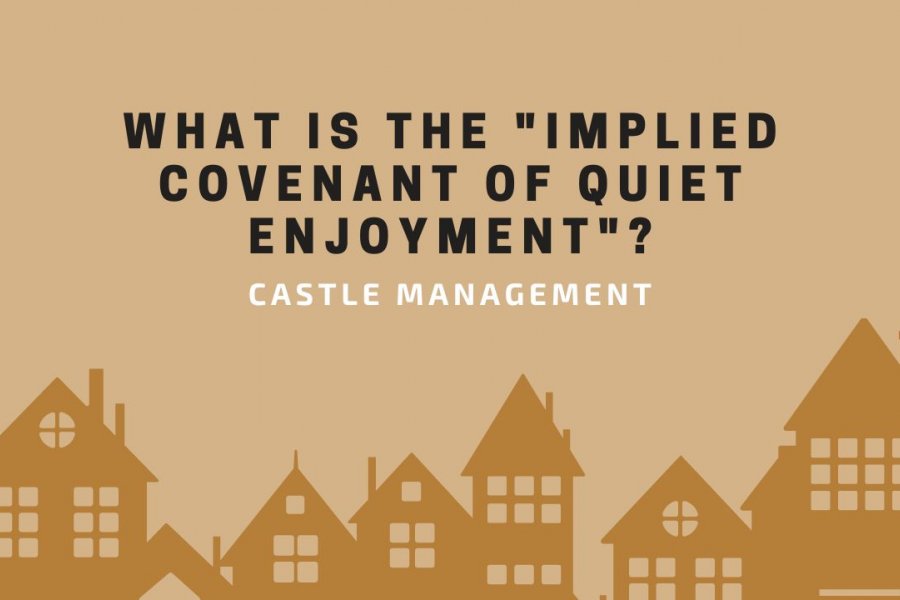
It's crucial to understand the legal obligations you have as a landlord to your tenants. One key concept is the "implied covenant of quiet enjoyment." This legal term may sound complicated, but it's essential for maintaining good tenant relationships and avoiding legal issues.
This article will explain what the implied covenant of quiet enjoyment means, how to recognize a breach of the rule, and the consequences of violating this covenant. We'll also provide practical tips on how to uphold this covenant and how Castle Management can help landlords with this concept and other similar aspects of a successful landlord-tenant relationship.
What Is the Implied Covenant of Quiet Enjoyment?
The implied covenant of quiet enjoyment is a legal promise embedded in every lease agreement. It ensures that tenants can use and enjoy their rented property without significant disturbances from the landlord or anyone else. This covenant is "implied" because it's automatically part of the lease agreement, even if it's not explicitly stated.
In practical terms, this means tenants have the right to live in their rental property peacefully. They should not face undue interruptions, harassment, or any actions that would make living in the property uncomfortable, impractical, or unsafe.
This covenant protects tenants from various forms of interference and ensures they can enjoy their home in peace. For landlords who own multi-family properties, it is especially important to uphold this covenant across multiple units and common areas to ensure a peaceful living environment for all tenants.

Indicators of a Breach of the Implied Covenant of Quiet Enjoyment
Understanding what constitutes a breach of this covenant can help landlords avoid actions that might lead to legal disputes. Some common indicators include:
Ignoring Security Issues
Tenants are entitled to feel secure in their homes. In a multi-family property, this means ensuring that common areas and individual units are secure.
If a landlord fails to address security concerns, such as broken locks, inadequate lighting, or other safety hazards, it can be considered a breach of the covenant. Ensuring the property is secure is not just a legal obligation but also a fundamental aspect of maintaining a good tenant-landlord relationship.
Practical Tip: Regularly inspect the property for potential security issues and promptly address any concerns reported by tenants. Implementing a routine maintenance schedule that includes security checks for common areas such as entrances, hallways, and parking lots can help prevent issues.
Unauthorized Entry
Landlords have the right to enter their property, but this right is limited. Unauthorized entry, or entering the property without proper notice or consent, violates the tenant's right to privacy.
In multi-family properties, this extends to both individual units and common areas. Landlords typically must provide notice (usually 24 hours) before entering for inspections, repairs, or showings, except in emergencies.

Practical Tip: Create a standardized procedure for notifying tenants when someone needs to enter the apartment, including clear communication of the date, time, and purpose of the visit. Using written notices or digital communication helps ensure tenants receive proper notification.
Failure to Make Necessary Repairs
When landlords neglect to perform necessary repairs, it can significantly impact a tenant's ability to enjoy their home. In a multi-family property, issues like plumbing problems, electrical faults, or structural damages can affect multiple units. These issues must be addressed quickly. Failure to make repairs can be a breach of the covenant of quiet enjoyment, as it creates an unlivable or uncomfortable environment.
Practical Tip: Establish a clear and efficient process for tenants to report repair needs, and ensure you respond quickly and provide a resolution. Using property management software can help track and prioritize repair requests effectively, particularly in multi-family properties where multiple repair requests may be submitted simultaneously.
Disruption of Essential Services
Services like water, electricity, and heating are vital for a livable home environment. If a landlord fails to provide these services or disrupts them without a valid reason, it can severely affect the tenant's quality of life. In multi-family properties, disruptions to these services can impact multiple tenants at once, exacerbating the problem.
Practical Tip: Maintain regular servicing and inspections of essential service systems to prevent disruptions. Have a contingency plan in place to address service interruptions quickly and minimize tenant inconvenience. Ensure communication systems are in place to promptly inform all tenants in the event of a service disruption.

Creating a Nuisance
Landlords should avoid actions that could be considered nuisances to their tenants. In multi-family properties, this includes managing noise levels, maintaining clean common areas, and preventing disruptive activities. Such nuisances can stem from construction activities, loud parties, or even landlord behavior.
Practical Tip: Schedule potentially disruptive activities, like construction, during times that are least likely to inconvenience tenants. Communicate openly with tenants about any unavoidable disruptions and take their feedback into account. In multi-family properties, consider implementing quiet hours and policies to manage noise.
Constructive Eviction
Constructive eviction happens when a landlord's behavior or failure to act renders the property uninhabitable, forcing the tenant to leave. In multi-family properties, this could include severe neglect of repairs, allowing significant damage to go unchecked, or any other behavior that forces tenants to leave.
Practical Tip: Regularly monitor the condition of your properties and swiftly address any issues that arise. Keeping open lines of communication with tenants can help identify problems before they escalate.
Acts of Harassment or Retaliation
Harassment or retaliation against tenants for exercising their legal rights, such as requesting repairs or reporting issues, is strictly prohibited. Any form of intimidation, threats, or punitive actions by the landlord can be considered a breach of the covenant. Tenants have the right to live without fear of retaliation for asserting their rights.

Practical Tip: Foster a respectful and professional relationship with tenants by addressing their concerns fairly and without bias. Implementing a transparent and documented process for handling tenant complaints and requests can help prevent accusations of harassment or retaliation.
Consequences of Violating the Implied Covenant of Quiet Enjoyment
Breaching the implied covenant of quiet enjoyment can lead to significant consequences for landlords. Here are the typical steps and potential outcomes if a breach occurs:
1. Tenant Submits a Written Complaint
When tenants feel their right to quiet enjoyment is being violated, the first step is often to submit a written complaint to the landlord. This complaint should detail the issues and request a resolution.
2. Responding to the Complaint
It's important for landlords to take these complaints seriously and address them promptly to avoid escalation. Acknowledge the issue, communicate your plan to resolve it, and take action quickly. Failure to respond or ignoring the complaint can exacerbate the situation and lead to further legal complications.
3. Escalation by Tenants
If the landlord does not resolve the issue, tenants may escalate the matter. This can involve withholding rent, making repairs and deducting the cost from the rent, or even moving out and suing for constructive eviction. Tenants may also report the issue to local housing authorities or take legal action for damages.
Bottom Line
Maintaining the implied covenant of quiet enjoyment is crucial for avoiding legal disputes and maintaining positive relationships with long-term tenants. By understanding what constitutes a breach and the potential consequences, landlords can take proactive steps to uphold their tenants' rights.
Castle Management offers comprehensive property management services that help landlords navigate these responsibilities effectively. Our team can assist with regular property inspections, compliance with legal requirements, effective communication and security improvements.
By partnering with Castle Management, you can ensure your responsibilities are taken care of, maintain a peaceful living environment for your tenants, and avoid potential legal issues related to the implied covenant of quiet enjoyment. Get in touch with us today.
